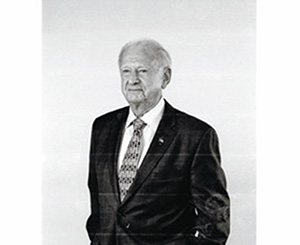

I have just recently completed translating the letters that my father, Josef Strauss, Z’L, wrote to my mother, Bertha Strauss, Z’L, from on board the M/S St. Louis in May/June 1939. The letters were saved by my mother and brought to the US from Germany in 1941. After Hashem had taken my parents to Himself, I realized that the onion skin (Luftpost Papier) paper, which the letters were written on, was deteriorating. I therefore donated them, together with all my other personal and family Holocaust memorabilia, in my brother Herman’s, Z’L, and my name to the Museum of Jewish Heritage in New York. Copies were retained by me. The Museum had the facility to properly preserve the paper.
Recently it was brought to my attention that one page, of the total 18 pages, was on permanent exhibit at the Museum. But since the letters are all in German, the meaningful content would be lost, unless a translation could be made.
Most of the letters, which are on legal-size paper, are in my father’s handwriting; only a little is typed. Whether due to postage restrictions, shortage of paper or other reasons, some of the writing is very small and consequently illegible. Wherever I could not read a word, I have indicated it by adding ……. in its stead.
I have tried, hopefully with some success, but sometimes unsuccessfully, to retain my father’s style, without distracting from what he was trying to convey. Translating from the German into English is a difficult task, in view of the different sentence structure styles between the two languages. In translating German, one first reads the whole sentence in order to find the verb, which usually appears only at the very end, interspersed with numerous commas and tangential thoughts. Where my father used colloquial expressions, which do not lend themselves to direct translation, I have taken the liberty to freely translate what I perceived my father’s meaning might have been at the time. For some Hebrew words I have retained my father’s original spelling.
I have conferred with the curator of the museum, and have obtained confirmation, that I am permitted to make use of the material, even though the museum is the owner of all the material we donated to them.
I am dedicating this “work” in memory of my beloved parents, and their siblings and family, who perished in the Holocaust, many of whose names are mentioned in the letters:
Wilhelm Strauss, brother of my father, wife Hanna and sons Max and Heinz.
Rosa Kohlhagen, sister of my father, and husband Karl
Frieda Halberstadt, sister of my father, and husband Jonas
Rahel Posin, sister of my mother, and daughter Naomi (husband Alex survived)
May hashem grant them peace.
Also mentioned in the letters are the following additional names of relatives who survived the Holocaust:
Walter Kohlhagen, lived in New York, son of Karl and Rosa Kohlhagen
Benno Herz, lived in Cuba then New York, son of Bertha Herz, sister of my father
Paul Nathan, and wife Ruth, lived in New York, brother of my mother
Bessy and Leo Halberstadt, lived in England, Canada and Israel, children of Jonas and Frieda Halberstadt
All other names mentioned are friends of my parents and/or are passengers on board.
The reader will be amazed after reading these letters, that in May/June 1939, a half year after Kristallnacht, only a few months before the outbreak of the war in September, with millions of Jews already in concentration camps, or on the way to them, with millions of other Jews living in ghettos, a ship flying the hated Swastika flag was the most luxurious accommodation for almost 1000 Jews, served respectfully by an all-German crew, including even a “synagogue servant” to take care of the shul. Shul announcements were published on the ship’s bulletin boards.
I do not want to close without making a remark here about the captain of the ship. My father says nothing about him in his letters, probably because the captain had little or no direct contact with the passengers, and therefore my father maybe was not aware of the kind of person he was. I will quote what I wrote in “My Stories” (page 17) about the Captain of the St. Louis, Gustav Schroeder:
“Although the ship and the crew were German, and although it was known that several members of the crew and officers were Nazis, and were filing reports with the Gestapo, the Captain was always a gentleman, treating the passengers with respect and consideration. He stated that he was the Captain of the ship, and that all passengers were his guests. He was threatened by the crew and officers for treating the Jews so humanely, but he persisted until the end. In consideration for his wonderful and courageous behavior, he was subsequently declared a “Righteous Gentile” and a tree was planted in his honor and memory at the Yad Vashem Holocaust Memorial in Jerusalem.”
May the memory of all those who gave their lives during the Holocaust be a blessing to the survivors.
By Norbert Strauss
Norbert Strauss is a Teaneck resident and has been a volunteer at Englewood Hospital for the past 30 years. He was general traffic manager and group VP at Philipp Brothers Inc., retiring in 1985. Prior to Englewood Hospital he was also a volunteer at the American Committee for Shaare Zedek Hospital for over 30 years, serving as treasurer and director. He frequently speaks to groups to relay his family’s escape from Nazi Germany in 1941. He has eight grandchildren and 23 great-grandchildren.










